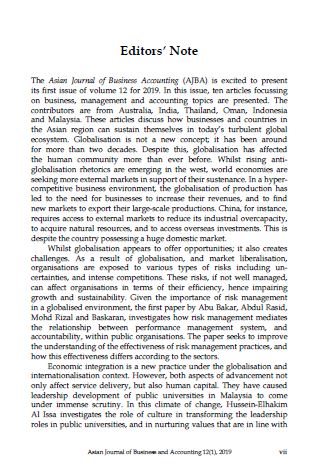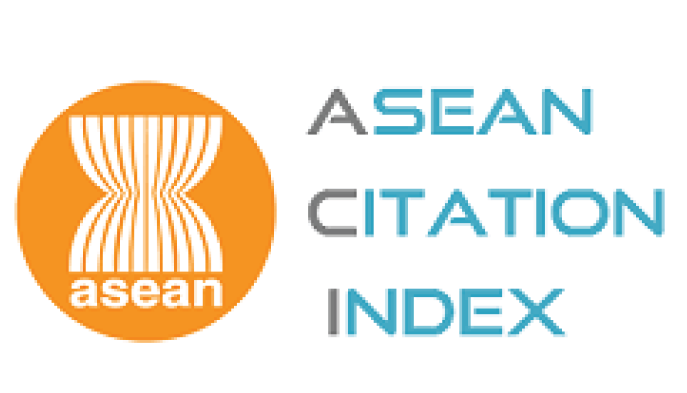Editors’ Note
Abstract
The Asian Journal of Business Accounting (AJBA) is excited to present its first issue of volume 12 for 2019. In this issue, ten articles focussing on business, management and accounting topics are presented. The contributors are from Australia, India, Thailand, Oman, Indonesia and Malaysia. These articles discuss how businesses and countries in the Asian region can sustain themselves in today’s turbulent global ecosystem. Globalisation is not a new concept; it has been around for more than two decades. Despite this, globalisation has affected the human community more than ever before.
Whilst rising antiglobalisation rhetorics are emerging in the west, world economies are seeking more external markets in support of their sustenance. In a hypercompetitive business environment, the globalisation of production has led to the need for businesses to increase their revenues, and to find new markets to export their large-scale productions. China, for instance, requires access to external markets to reduce its industrial overcapacity, to acquire natural resources, and to access overseas investments. This is despite the country possessing a huge domestic market. Whilst globalisation appears to offer opportunities; it also creates challenges. As a result of globalisation, and market liberalisation, organisations are exposed to various types of risks including uncertainties, and intense competitions. These risks, if not well managed, can affect organisations in terms of their efficiency, hence impairing growth and sustainability. Given the importance of risk management in a globalised environment, the first paper by Abu Bakar, Abdul Rasid, Mohd Rizal and Baskaran, investigates how risk management mediates the relationship between performance management system, and accountability, within public organisations. The paper seeks to improve the understanding of the effectiveness of risk management practices, and how this effectiveness differs according to the sectors.
Economic integration is a new practice under the globalisation and internationalisation context. However, both aspects of advancement not only affect service delivery, but also human capital. They have caused leadership development of public universities in Malaysia to come under immense scrutiny. In this climate of change, Hussein-Elhakim Al Issa investigates the role of culture in transforming the leadership roles in public universities, and in nurturing values that are in line with the internationalisation initiatives. Based on the data collected from academic leaders who are attached to the public universities in Malaysia, it is suggested that more efforts should be invested in promoting, and transforming the desired organisational culture, in preparation for transformational leadership. The next paper by Sarapaivanich, Trakarnsirinont, Laohavisudhi and Viriyachinkarn, explores how the ASEAN Economic Community (AEC) members, like Thailand, respond to the needs of the International Education Standard (IES). Using the theory of existence, relatedness and growth needs (ERG) theory, they examine the factors affecting the development of accounting professionals’ essential skills, as specified by the IES.
The ever-increasing trend of international harmonisation of accounting standards has also influenced Asian organisations into undertaking significant reforms by engaging in the voluntary disclosure of management forecasts, which offer rich information to investors for decision-making purposes. Reflecting on this, Phonsumlissakul, Audsabumrungrat and Durongwatana conduct an experimental research to determine the effect of accounting knowledge and selfserving attribution bias on the voluntary disclosure of management earnings forecast. They find that managers with low accounting knowledge are more likely to withhold information if the cause of the unfavourable performance is caused by internal factors. Similarly, within the Indonesian context, Rokhayati, Nahartyo and Haryono examine the effects of financial information and corporate social responsibility (CSR) disclosure on investment decision. Their findings demonstrate that CSR disclosure, based on regulatory focus can be more effective for investment decision, especially when it has a prevention focus. This suggests that firms need to disclose their CSR activities by taking into consideration the situational aspects. This is based on the prevention focus which emphasises on avoiding social and environmental negative effects.
The deregulation practices caused by the effect of globalisation has also pressured financial institutions to terminate the complacent approach they used to apply, and to look for more strategic tools to help them to succeed, survive and be sustainable. Considering this, the sixth paper by Phornlaphatrachakorn emphasises on the application of strategic management accounting (SMA) as an important tool to provide quality management information. This application can help organisations in Thailand to detect problems posed by globalisation. The practice can enable the management to respond to the challenges in a timely manner. The paper also indicates that transformational leadership, organisational learning and technological innovations have a positive influence on strategic management accounting. The subsequent paper by Panda and Bag examines the impact of ownership structure on the financial and market performance of Indian listed firms, post the US financial crisis of 2008 which was one of the worst financial epidemics ever witnessed by the world. The crisis has had a severe impact on investors’ sentiments and corporate performance, especially in the context of emerging Asian countries. They find that the impact of the crisis is particularly significant due to the more globalised and connected world. The study finds that large ownership is related to market performance, with the foreign institutional environment impacting on market performance. There has also been much discussions circulating among policymakers and policy-oriented economists on the impact of globalisation on inflation. Investors are confronted by one pertinent question, that is, whether the returns of their investments will protect them against inflation. In responding to this, Lee and Isa conduct an empirical analysis based on the quarterly data gathered from the period of 1980 to 2016. They find that stocks and government bonds in Malaysia can serve as a complete hedge against inflation in the long-run while real estate shows partial hedging against inflation. Gold and Treasury bills, however, are certainly not appropriate as hedges for inflation.
As a major contributor to globalisation, the tourism sector could bind diverse cultures which exist within and between countries. Intensive globalisation has led to the growing importance of green tourism, and creative industry. To attract international tourists, local communities have found it imperative to assert their identity by using their cultural assets, and exotic natural habitats to generate distinction. These are perceived to be more authentic. In relation to this issue, Lumbanraja, Lubis and Hasibuan investigate the role of creative industry, green tourism marketing and tourism experience in building tourism satisfaction within the context of Lake Toba, Indonesia. Based on the data collected from tourists who visited the destination, tourism experience is found to play a mediating role in the relationship between creative industry, green tourism marketing and tourism satisfaction.
The impact of globalisation is also felt by the manufacturing sector. Although globalisation allows the manufacturing companies to access larger markets, it also increases market competition, thereby resulting in price fluctuations, higher input costs, and disruptive new technologies. With more external parties involved, manufacturing firms are exposed to higher levels of supply chain risks. In relation to this, the final paper, by Perera, Soosay and Sandhu explores how dynamic capabilities can foster a competitive advantage. The strategic and operational agilities of business are suggested as the driving factors enabling manufacturers to respond to market changes, and to remain competitive.
The papers presented in this issue demonstrate the prevalence of globalisation, which is here to stay, with all its challenges and opportunities. This phenomenon contributes to today’s dynamic business environment which is affecting and compelling organisations, regardless of sectors and countries, to respond to these changes aptly, and to find strategies to sustain themselves. That said, we believe that the ideas and recommendations presented in the papers will serve as important guides for organisations to address the impact of globalisation and internationalisation. On a final note, we would like to thank the Malaysian Accountancy Research and Education Foundation as well as the Malaysian Ministry of Higher Education, for the financial support extended. We also wish to say thank you to our members of the editorial and advisory boards as well as the reviewers for their time and effort put into AJBA. Happy reading!
Downloads








